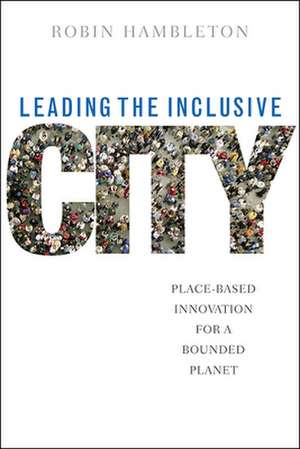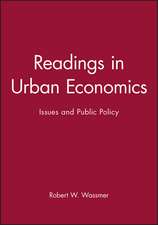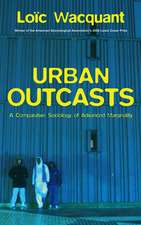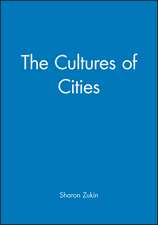Leading the Inclusive City: Place-Based Innovation for a Bounded Planet
Autor Robin Hambletonen Limba Engleză Paperback – 23 noi 2014
Growing global inequality is often at its most stark in cities—and cities themselves are often seen as powerless to affect the problem, which is driven more by national and global trends than by local policies. While acknowledging the difficulties cities face, Leading the Inclusive City mounts a powerful case that cities do have tools at their disposal for ameliorating inequality, advancing social justice, promoting environmental responsibility, and bolstering community empowerment. Using examples from cities around the world, Robin Hambleton educates and inspires, offering practical ideas for local leaders who want to change urban life for the better.
| Toate formatele și edițiile | Preț | Express |
|---|---|---|
| Paperback (1) | 338.99 lei 3-5 săpt. | |
| Bristol University Press – 23 noi 2014 | 338.99 lei 3-5 săpt. | |
| Hardback (1) | 787.59 lei 6-8 săpt. | |
| Bristol University Press – 23 noi 2014 | 787.59 lei 6-8 săpt. |
Preț: 338.99 lei
Nou
Puncte Express: 508
Preț estimativ în valută:
64.87€ • 70.44$ • 54.49£
64.87€ • 70.44$ • 54.49£
Carte disponibilă
Livrare economică 01-15 aprilie
Preluare comenzi: 021 569.72.76
Specificații
ISBN-13: 9781447304968
ISBN-10: 1447304969
Pagini: 256
Ilustrații: 25 black & white illustrations
Dimensiuni: 152 x 229 x 28 mm
Greutate: 0.68 kg
Editura: Bristol University Press
Colecția Policy Press
ISBN-10: 1447304969
Pagini: 256
Ilustrații: 25 black & white illustrations
Dimensiuni: 152 x 229 x 28 mm
Greutate: 0.68 kg
Editura: Bristol University Press
Colecția Policy Press
Notă biografică
Robin Hambleton is professor of city leadership in the Centre for Sustainable Planning and Environments at the University of the West of England, Bristol, and director of Urban Answers.
Cuprins
Preface
A guide to the book
Innovation Stories
Overview
Place-based leadership and the inclusive city
Part 1 Diagnosis: Understanding trends and challenges
Global trends and our urban future
The changing nature of public service reform
Part 2 Concepts: Place, leadership, innovation and democratic governance
Understanding place and public policy
Place-based leadership
Leading public service innovation
Democratic urban governance
Part 3 Experiences: Place-based leadership in action
Leading the eco-city
Creating people-friendly cities
The diversity advantage
Part 4 Lesson drawing: Insights and international learning
From smart cities to wise cities
International lesson drawing
A guide to the book
Innovation Stories
Overview
Place-based leadership and the inclusive city
Part 1 Diagnosis: Understanding trends and challenges
Global trends and our urban future
The changing nature of public service reform
Part 2 Concepts: Place, leadership, innovation and democratic governance
Understanding place and public policy
Place-based leadership
Leading public service innovation
Democratic urban governance
Part 3 Experiences: Place-based leadership in action
Leading the eco-city
Creating people-friendly cities
The diversity advantage
Part 4 Lesson drawing: Insights and international learning
From smart cities to wise cities
International lesson drawing
Recenzii
“Inclusiveness and sustainability are common themes in current urban planning. Hambleton argues that creative leadership by local innovators is an essential step to both kinds of development. . . . This is emphatically not the ‘new public management’ of the 1990s or the neoliberal preference for private markets over governmental intervention. Rather, the development Hambleton advocates will be brought about by close collaboration among public officials, businesses, nonprofits, and individual community leaders who are committed to inclusive policies. This is a useful work for practitioners as well as academics, offering conceptual and instrumental insights that should stimulate cross-disciplinary dialogue. . . . Recommended.”
“One of the more interesting and helpful characteristics of the book is that it provides seventeen‘Innovation Stories,’ drawn from cities across the world. . . . The presentation of Innovation Stories proves useful in bridging ‘the worlds of academia and practice.’”
“This book is one which scholars will admire and politicians and policy makers will not want to miss.”
“An engaging exploration of local leadership and the potential for social and environmental justice.”
“Leading the Inclusive City lays the groundwork for an important call to action. The author makes the case that in a time of rapid change, progress demands innovation, and in a time of increasing inequality, innovation demands inclusion.”
"Raises important issues regarding the creation of more just and ecologically sensitive cities."
"It is a timely re-formulation and consolidation of various strands in current thinking about places, and its optimistic signposting of a possible future makes it required reading."













